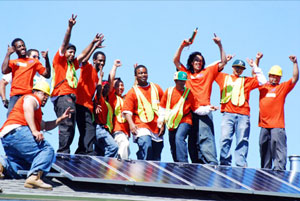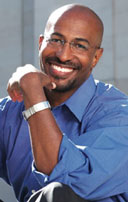CHARLENEM
What’s the Green Industry and Why Is Everybody Talking About It?

LOS ANGELES (FinalCall.com) – Ever since President-elect Barack Obama declared his desire to create five million green collar jobs, the buzz about a green economy has skyrocketed. While many people have been working on the front lines of the Green Movement for decades, going green is still a mystery for too many others, especially Blacks.
Some people believe that use of the term green began in the 1960s with protests against environmental pollution and toxic waste dumps. But research indicates that the whole green concept is as old as nature itself. It refers to an environment-friendly way of life that is also friendly to companies’ profit margins.
According to green practitioners, although the green concept seems very vague, it encompasses every aspect of life. For instance, green involves the air you breathe, the food you eat, the lotion you put on your body, your hair care products, the medicines you take, the water you drink or bathe in, and recycling and re-using products.
“One thing that I think that African Americans should understand is that the values African and indigenous people have had since the beginning of time are now being repackaged to the world as something new and called ‘green.’ This is what our great grandmothers were telling the colonizer in the beginning, that we have to respect the earth and we can’t put a price tag on everything,” said Van Jones, founder of Green for All, a national organization that works to build a green economy to help lift people out of poverty. He is also the author of “The Green Collar Economy: How One Solution Can Fix Our Two Biggest Problems.”
Understanding the green movement means understanding its language, which consists of words like “biodegradable,” which refer to materials that will decompose quickly without harming the environment. Some other green terms are:
– Energy-efficient–products use less energy and cost less over a lifetime;

– Sustainable–good for present and future use;
– Hybrid–runs on electric battery and fuel;
– Organic–made from plants or insects;
– Renewable energy–products are not drained after use (such as solar energy);
– Alternative energy–energy that comes from wind or solar sources.
Activists in the green movement warn that if Blacks are going to reap some benefit, whether financially, health-wise or environmentally, they have to start organizing now, because they are already behind. Unfortunately, Mr. Jones said, the prevailing perception is that the industry is reserved for White people but that is simply untrue.
A change in this mindset could mean economic growth for Black entrepreneurs, investors and inventors, as well as workers compared to the alternative, which is consistently polluted neighborhoods, failing health as a result, and low or no employment.
Some avenues out of low or no employment include green-collar gateway jobs, such as energy auditors (who point out ways to save energy), and work like wrapping hot water heaters with blankets, installing insulation, plugging holes, repairing cracks, and hauling out old appliances.
Green collar jobs also encompass technology, agriculture, mass transportation, water management, construction and more. Although it will be fairly easy to obtain qualifications or certification to work in several of the fields, Mr. Jones said, it will be near impossible, in the future, for companies or skilled workers to obtain contracts without green certification. They will either need to get short-term training, recertify their companies, or upgrade their equipment, he said. Such requirements have implications for construction and related industries in qualifying for contracts and the types of services needed.
Other green industry leaders include former pro basketball player Will Allen, creator of Growing Power, an urban vegetable farm in Milwaukee that feeds 2,000 people a week; and the Black Oaks Center for Sustainable Renewable Living in Chicago, which provides education and training in energy conservation, local renewable energy production, sustainable housing and water conservation.
Naomi Davis founded Blacks in Green, a community education and trade association based in Chicago, to help link the health and wellness benefits of a green economy to communities of color. “By the year 2050, 75 percent of the built (or manmade) environment will be replaced in some way, either because old stock will be demolished and replaced or existing stock will be renovated or newly constructed,” she said.
That means that electricians, plumbers, carpenters, all existing jobs, will have to be retooled because existing energy sources, such as solar energy and wind power, are becoming more sophisticated, simpler and cost effective, Ms. Davis added.
(This is the first in a three-part series.)












